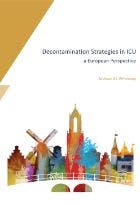Bastiaan Wittekamp
Decontamination Strategies in ICU – a European Perspective

- Datum
- (Co) promotoren
- 19-06-2018
- prof.dr. M.J.M. Bonten
Samenvatting
Patients admitted to the intensive care unit (ICU) have an increased risk to develop infections due to their underlying illness and the ICU environment facilitates transmission of micro-organisms. Potential pathogenic micro-organisms (PPMO) colonizing the oropharynx and lower gastro-intestinal tract are the target of decontamination strategies that aim to prevent infections, such as selective digestive tract decontamination (SDD), selective oropharyngeal decontamination (SOD), which both consist of antibiotic prophylaxis applied to the gastro-enteral tract and chlorhexidine (CHX) mouthwash. The interdependence between rectal and respiratory tract colonization and infection was explored among 2066 ICU patients treated with SDD. Rectal colonization was an independent risk factor for both respiratory tract colonization (cause specific hazard ratio (CSHR) 2.93, 95% confidence interval (CI) 2.02-4.23) and new GNB infection (CSHR 3.04, 95% CI 1.99-4.65). The association between colonization of the rectum and bacteremia was stronger than the association between respiratory tract colonization and bacteremia, which provides evidence that the gut acts as an important reservoir for PPMO. SDD and SOD have been used as standard care for ICU patients in the Netherlands after studies showed improved survival and prevention of bloodstream infections among long-stay ICU patients. In this thesis we evaluated two aspect of SDD and SOD in the Dutch ICU setting. First, the long-term effects of SDD and SOD on tobramycin and colistin resistance were evaluated in five Dutch ICUs with an average follow-up of 7 years. Tobramycin resistance decreased during the follow-up period (rectal samples risk ratio RR (95% CI) 0.35 (0.23-0.53); respiratory samples RR 0.48 (0.32-0.73)), compared to baseline, and there was no difference in colistin resistance, indicating that long-term use is safe. Second, amphotericin B (commonly used in SDD and SOD) and nystatin (which is cheaper) were compared in their effectiveness against yeast colonization. Nystatin was associated with less rectal acquisition of Candida, compared to amphotericin B. Nystatin could therefore improve cost-effectiveness of SDD and SOD. Most previous studies on SDD and SOD with beneficial outcomes were performed in the Netherlands, with relatively low levels of antimicrobial resistance. Evidence for the effectiveness in settings with higher levels of antimicrobial resistance is lacking. Therefore, a cluster randomized study was initiated in 13 ICUs in 6 European countries. 8665 Patients were included. As opposed to previous Dutch studies, the use of SDD, SOD and CHX 1% mouthwash were, compared to standard care, not associated with reductions in rates of ICU-acquired bloodstream infection or mortality. Furthermore, initial use of CHX mouthwash in a 2% concentration was abandoned as it led to side-effects in 10% of patients, mainly consisting of reversible oral mucosal lesions. The unit-wide prevalence of HRMO carriage in respiratory tract and rectum remained stable during interventions. Moreover, GNB resistant to carbapenem and cephalosporins, that were present during initial ICU stay were more frequently eradicated in rectum samples during SDD compared to standard care. Also, for Enterobacteriaceae resistant to cephalosporins there was a tendency towards eradication in respiratory samples during SDD (CSHR 1.47 (95% CI 0.98-2.20)) and SOD (CSHR 1.38 (95% CI 0.92-2.06)), compared to standard care. This might prevent the occurrence of infections and cross-transmission of such bacteria.
